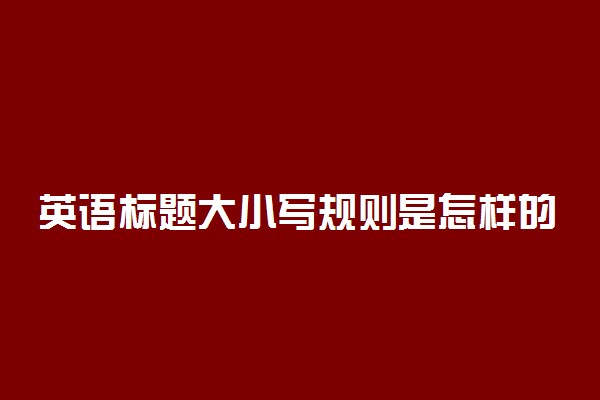不论是英语写作还是阅读,我们经常会遇到标题。写作的时候,可能不知道哪些词需要大写。阅读的时候,反射弧要是长一点,可能过了几行才恍然大悟,原来那个大写是标题啊!

标题中哪些词需要大写
1.Make sure the phrase you're working with is actually a title.
确定自己写的确实是标题
The following are titles that should be in title case:
以下几种都属于标题:
Titles of works (books, movies, articles, songs, magazines)
作品名(书籍、电影、文章、歌曲、杂志)
Titles of academic tests or papers
学术测试或论文名
In sentence case, the only thing that should be capitalized is the sentence's first word and any proper nouns.
如果是句子,唯一需要大写的就是第一个单词和专有名词。
2.Capitalize the first word in a title.
标题中首个单词要大写
So, in the title The Perks of Being a Wallflower, make sure to capitalize The—it's the very first word, and its capitalization tips off the reader that, hey, the title's officially starting.
在标题壁花少年(The Perks of Being a Wallflower)中,“the”一定要大写,它是第一个单词,大写可以提醒读者,这里开始是标题啦。
3.Capitalize all major words in a title.
标题中的主要单词要大写
How do we define a “major word”? Good question. A “major word” is a subject, noun, adjective, or verb—basically, any word whose meaning impacts the sentence and isn't a short little conjunction or preposition.
什么是“主要单词”呢?这个“主要单词”是主语(subject)、名词(noun)、形容词(adjective)或动词(verb)。基本上,任何一个主要单词的意思都会影响句子,而不是一个简短的连词或介词。
In the title Don't Tell Mom the Babysitter's Dead, “Tell,” “Mom,” “Babysitter,” and “Dead” are all major words—they're verbs (tell), nouns (mom, babysitter), and adjectives (dead describes the babysitter), and they all very much impact the sentence's meaning.
让我们来举个例子,加深一下印象。在标题“Don't Tell Mom the Babysitter's Dead”中,“Tell”、“Mom”、“Babysitter”和“Dead”都是“主要单词”。“Tell”是动词,“Mom和Babysitter”是名词,形容“Babysitter”的“Dead”则是形容词。它们都会对句子意思有影响,所以都应该大写。
4.While you're at it, capitalize every word that is four letters or longer.
4个字母或更长的单词都需要大写
If a word is longer than four letters, it automatically becomes “major”.
如果一个单词长度超过4个字母,就自动变成了“主要单词”。
5.Do a final skim for tricky punctuation that might change the rules of title case.
最后略读一下可能会改变标题大小写规则的标点符号
The English language—and its titles—are rarely simple. They're often broken up by punctuation. Titles, in particular, often feature colons.
英语语言和标题很少会简单。它们通常会被标点隔开。特别是标题,经常会遇到冒号。
英文标题大写有什么规则吗
以下均指首字母
1.题目的第一个单词要大写;
2.冠词都不需要大写;
3.字母多于三个(不含三个)的介词、连词首字母要大写;
4.名词、动词、形容词、副词、代词、感叹词首字母;
5.大写所有英语中要求大写的单词。如月份、人名、地名等等。
这几条原则的优先性是递减的,也就是说,如果几条原则之间出现了矛盾的情况,应优先使用前面的原则。如:如果题目的第一个单词是冠词或不多于二个字母的介词时也应该大写。
小编推荐
1.2025年465分能考英语专业吗 465分英语专业大学推荐
2.24年UBC本科国际生录取率是多少 对英语成绩有什么要求
4.2025年526分能考商务英语专业吗 526分商务英语专业大学推荐
5.2025年563分能考英语专业吗 563分英语专业大学推荐